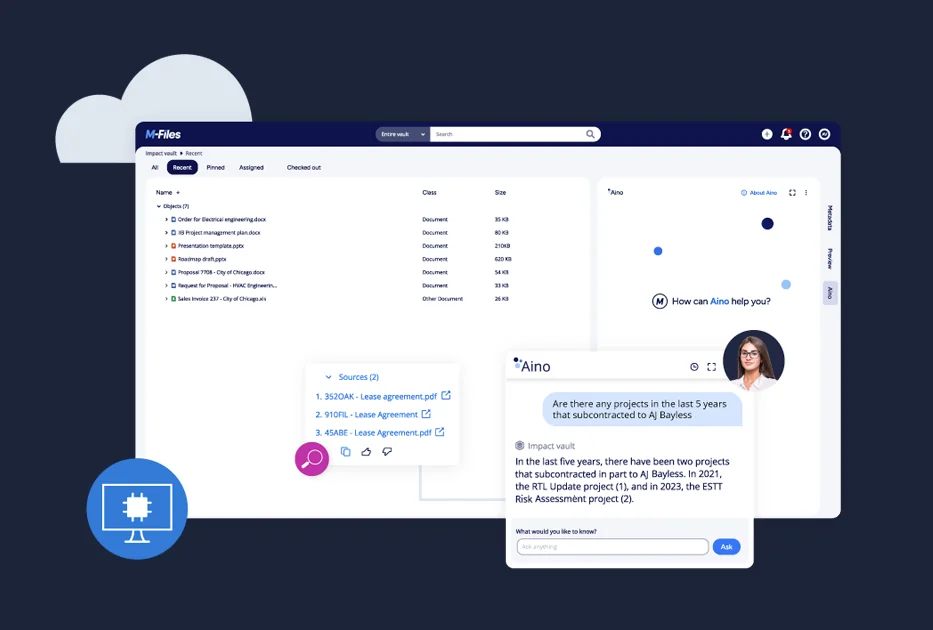What Is a Document Management System? Key Benefits & Uses

A document management system (DMS) is software that helps organizations store, classify, secure, and automate documents, cutting costs and improving team efficiency.
Understanding Document Management Systems
Most organizations work with a large volume of documents. These may include contracts, reports, internal records, and spreadsheets. Such files are essential for daily work and long-term goals, so they need to be organized and easy to access.
A document management system, or DMS, helps bring structure to this process. It gives teams the control they need to manage documents securely and automate key workflows.
Whether your organization is still using paper or already working digitally, a DMS can reduce clutter, save time, and improve efficiency.
What is a Document Management System (DMS)?
A document management system, or DMS, is software that keeps your files organized. It stores documents in one place so your team can find and use them quickly.
You can manage contracts, HR forms, project files, and more. Some systems use folders to keep things sorted. Others, like M-Files, use metadata instead. This means you search by what the file is about, not where it is saved.
A DMS improves how teams work. It saves time, cuts down on mistakes, and makes important files easy to access. Various DMS features such as metadata, version control, and access controls make that possible,
How does a DMS differ from traditional file storage methods?
A document management system replaces older storage methods such as filing cabinets, shared network drives, and basic cloud folders. These older tools can store documents but offer limited structure, security, and control.
Instead of simply storing files, a DMS helps teams manage them at every stage. It offers a smarter way to stay organized and meet compliance goals.
M-Files handles these tasks automatically in the background. This reduces manual work and helps teams stay consistent across projects and departments. Depending on your organization's needs, a DMS can be deployed either in the cloud or on-premises.
What are the key benefits of implementing a DMS?
A document management system helps teams work better. It improves efficiency, strengthens security, and supports compliance.
Here are some of the core DMS benefits:
- Files are easier to find through intelligent search and metadata
- Access is based on user role, document type, or business need
- Version tracking prevents mistakes and duplicate work
- Data is safer with centralized storage and backups
- Compliance is simpler through audit trails and retention policies
- Tasks move faster through automated workflows
- Teams rely less on paper, lowering costs and reducing errors
A good DMS improves both daily tasks and long-term document control.
Tools like M-Files help automate these tasks behind the scenes. This means teams spend less time managing files and more time getting work done.
What industries benefit most from a DMS?
Any organization that works with documents can benefit from a document management system. A DMS is especially helpful in industries that handle large volumes of complex or sensitive files.
A few examples include:
- Legal teams manage contracts, case files, and correspondence
- Healthcare providers store and protect patient records to meet regulations
- Construction and engineering teams track blueprints, permits, and plans
- Manufacturers manage safety documents, specs, and certifications
- Financial teams handle client records, audit files, and compliance tasks
- Government agencies organize internal records and public documents
- Schools and universities manage student files, transcripts, and communications
Even small and mid-sized businesses in professional services can benefit. A DMS helps manage documents with less risk and more control.
Solutions like M-Files are often used in these industries because they are flexible and easy to scale.
Who uses a DMS?
Different teams across an organization rely on documents to do their work. However, DMS tools are especially helpful for teams that handle a high volume of files every day.
Common examples include:
- Legal teams managing contracts and policies
- Project teams sharing documents across sites
- HR departments keeping track of employee files
- Finance teams overseeing approvals and audits
Industries like construction, manufacturing, and professional services depend on DMS tools. In these environments, structure and consistency matter.
Why use DMS?
A DMS solves everyday problems like lost files, version confusion, and inconsistent processes.
When documents are scattered across inboxes, folders, and shared drives, teams waste time and make avoidable mistakes. A DMS creates order. It keeps content in one place, tracks changes automatically, and ensures the right people have access to the right files at the right time.
The result is fewer errors, stronger compliance, and smoother collaboration, all of which contribute to a strong return on investment from using a DMS.
Summing Up DMS Essentials
A document management system does more than store files. It helps your team stay organized, protect information, and work more efficiently.
With intelligent search, secure access, version control, and workflow automation, a DMS improves how you manage documents from start to finish. It helps you save time, reduce risk, and keep everything in one place. Of course, choosing the right DMS ensures you get the most from these capabilities.
For a complete overview of document management systems, visit our Ultimate Guide to Document Management Systems.









